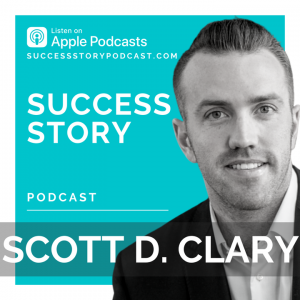 In this podcast, Kevin Hancock speaks to Success Stories host Scott D. Clary about the leadership style he has implemented at Hancock Lumber. He shares how he developed this shared leadership philosophy and the impact it has had on his employees and the business itself. He believes that every voice should be heard, trusted, and respected, and that by sharing the leadership responsibility better ideas are born. Kevin also talks about how this impacts employee engagement, job satisfaction, self worth, and how people feel about the company they work for. He finishes by talking about what he hopes the future holds, both for the company and for the world.
In this podcast, Kevin Hancock speaks to Success Stories host Scott D. Clary about the leadership style he has implemented at Hancock Lumber. He shares how he developed this shared leadership philosophy and the impact it has had on his employees and the business itself. He believes that every voice should be heard, trusted, and respected, and that by sharing the leadership responsibility better ideas are born. Kevin also talks about how this impacts employee engagement, job satisfaction, self worth, and how people feel about the company they work for. He finishes by talking about what he hopes the future holds, both for the company and for the world.
Click here to listen to the full podcast.
Here are a few highlights from the podcast (click here for the full transcription):
- So I kind of stumbled upon this idea, and then really got serious about how a company would institutionalize a structure of dispersed power and shared leadership, where everyone felt like they had a voice. So we went to work really re-setting our core systems to be more inclusive, and to create more space for dialogue. Essentially, patience for process so that everyone could have an opportunity to participate in discussions around the most important choices the company was making. And we learned pretty quickly that the real key to making that work was to change the purpose and nature of listening. (08:46- 09:53)
- People are much more apt to support that which they’ve helped to create. So in this period where we’ve tried to create space for all voices to lead, our efficiencies improved dramatically, our accuracy has improved dramatically, our rework has gone down, our productivity has gone up, and the company’s performance really took off. I’ll put it in perspective this way, we ended up earning more money, the company, from 2010 to 2020, then we did from 1848 to 2009. (11:24-I2:13)
- So I could spend 65 hours a week at work, but this would not make me a better human or a better manager. The purpose of work is to support, not thwart, the meaning of life. Companies must create pay systems, work schedules, and human missions, that put time back into the hands of employees. The objective is to help everyone get out of their lane and to broaden their lives. (17:59-18:17)